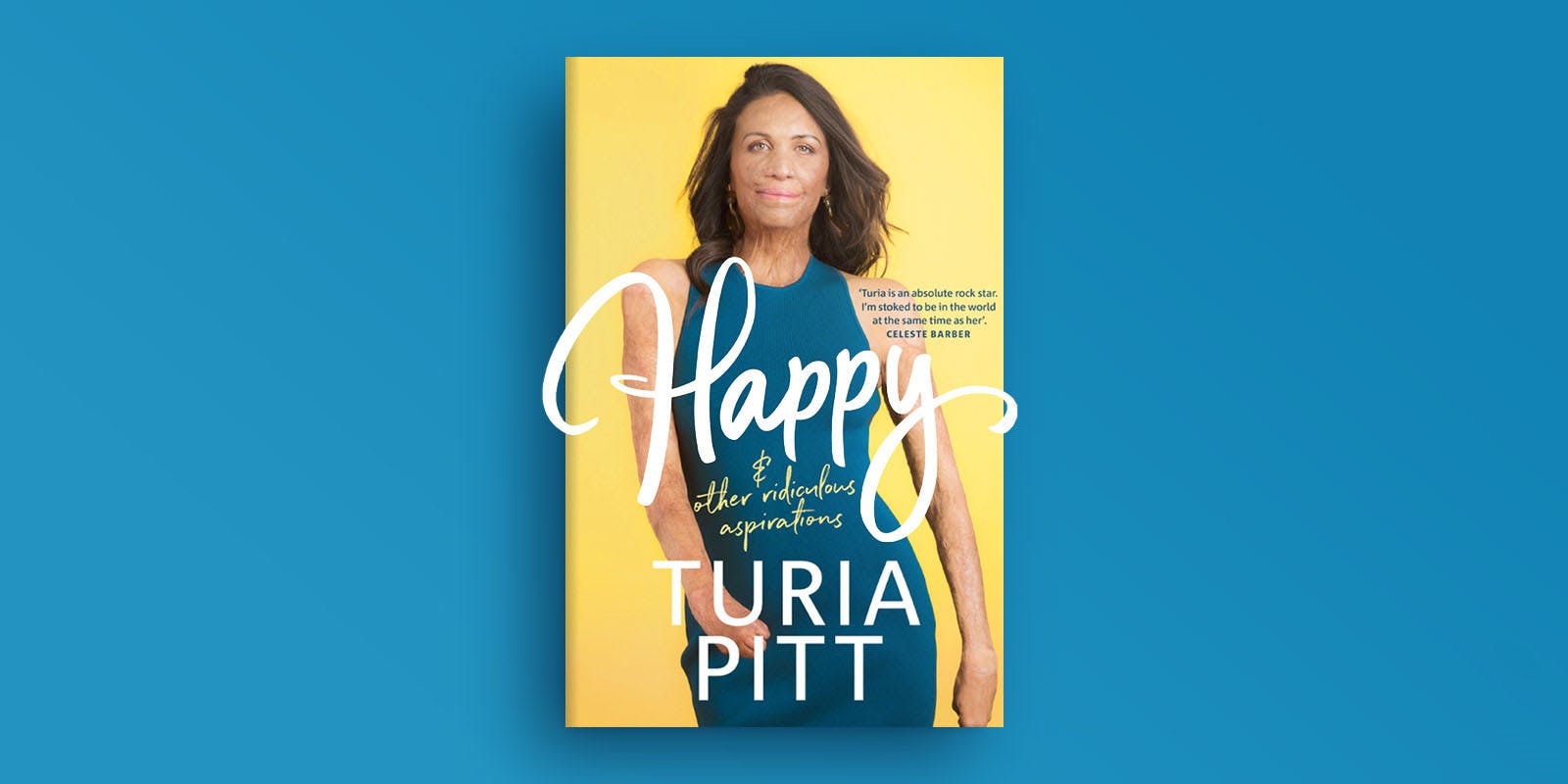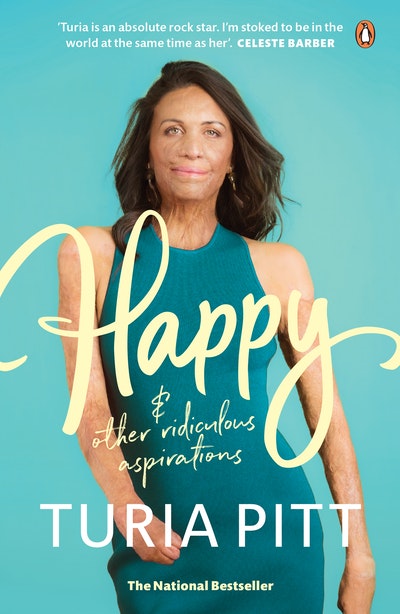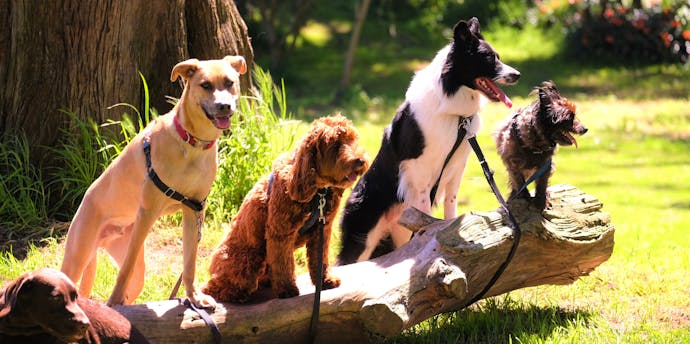Turia Pitt on how to make early starts work for you.
Covering everything from morning routines to love, money and purpose, Turia Pitt’s Happy (and other ridiculous aspirations) sets out to answer the question: ‘can you actually get happier?’ An athlete who survived a grassfire and then went on to become a bestselling author and humanitarian, Pitt is living proof that, with the right mindset, anything is possible. As she writes in the book’s introduction ‘…winning the lottery or getting divorced, don’t have as big an impact on our happiness levels as we might imagine. It’s how we deal with both the events we didn’t see coming, and the ones that are in our control, that’s key to our ability to enjoy our lives.’
One thing you can control is how you start your day. As Pitt puts it: ‘each morning is like a whiteboard that’s been expunged of all the whiteboard marker, fresh and clean and beseeching you to scribble all over it.’ In the passage below she offers a step-by-step guide to getting your day off to the best possible start (hint: don't check your phone).
Now I love my mornings so much I’m tempted to hop back into bed with them. And while I think it’s ridiculous to tell someone all about your morning routine (as if you are the authority on a time of day), it turns out I’m exactly that kind of ridiculous person. Cos I’m gonna tell you what I do, every morning.
You can laugh at it, laugh at me, use some of the tips or not use any of them. Up to you.
Every morning, I start the day in the same way (or, note: I try to start the day in the same way – I am, alas, a mere human, and thus flawed and fallible).
Step 1: A morning routine starts at, um, night!
Yep. A good morning always starts the night before. A good night’s sleep is key. Like I said earlier, I used to glorify a lack of sleep. These days? That shit is precious. Commodified. Necessary to our survival.
We all know how you feel after a good night’s sleep – as if your whole body has been soaked in a feel-good solution. And the day? The whole day goes your way! You exceed your instructor’s expectations at your morning Zumba class. Your fresh juice at breakfast is tantalisingly delicious. You benevolently allow the car in front of you to nudge into your lane. Your creativity is through the roof. You blast everyone with a radiant smile. You have time to ensure you’re wearing matching socks.
Sleep, man. It’s a drug. One that we should all get happily addicted to. Read more about it in the ‘Zest’ chapter.
These days, I sleep next to my progeny (I’m scared of the dark, and it really helps alleviate that). Hakavai is usually asleep, god and all the deities willing, by 7.30 pm. If I’m all out of sleeping tablets and red wine (JK, JK! I prefer vodka) I go to bed at around nine. Even if I’m not tired. And once I’m in bed, I read. Sometimes, I’ll get an hour of reading time to myself (my bliss) and sometimes I’ll fall asleep immediately.
Step 2: Waking
The peacock calls (Hakavai sits up in bed and woofs like a dog), I glide out of my gossamer sheets (untangle the doona), slip on my finest silk slippers (hiking socks) and drink a cup of the rarest opium tea (head blindly for the coffee machine).
After that’s done, I don’t do something.
What’s that something? I don’t look at my phone. Because what happens when you look at that magic little rectangle, dear reader? Well, if you’re anything like me, you get sucked into a digital vortex of (mostly bad) news stories, emails and calendar notifications, Instagram stories, your Twitter and Facebook feeds, and all of a sudden you’re thinking about what everyone else is doing before you’ve even considered what you would like from your day, thank you very much.
Looking at your phone first thing has also been shown to make you feel anxious and stressed, and already ‘behind’, even though it’s the goddamn first thing in the morning. Look, there’s plenty of time to feel like that later in the day. No need to drag those feelings into the day so early on.1
The mornings are sacred and special. And most importantly, they’re yours. Don’t clog them up looking at other people’s shit.
Step 3: Making the bed
A boring and mundane task?
I used to be one of those people who leapt out of bed in the morning and failed to revisit the scene of the crime until night (because, y’know, busy-ness). I could see my messy, unmade bed from the kitchen table where I worked, complete with random socks dispersed all over the floor.
Then one day Michael bought me a book called Make Your Bed by a former US Navy SEAL, Admiral William McRaven. I was affronted by Michael’s implication that I was untidy person who needed instructions for the most basic of household tasks (which, let’s be honest, I probably did) so there it sat, forlorn and uncared for, on my shelves for months.
And then I was sent a link to McRaven giving a speech. A friend sent it to me. (Michael! Michael had the audacity to send it to me.) The video link landed in my inbox on a day when I really did not feel like writing. So I watched it.
In a word (or two!)? Mind-blowing. Life-changing. And yes, we’re still talking about making your bed.
Why is making your bed important? And how does it lead to making you happier? Well, if you make your bed in the morning, you start off with a win. True, it’s a minuscule win, but it’s a win nonetheless, and that propels you forward. Making your bed, says McRaven, reinforces the fact that the little things in life matter, ‘and if you can’t do the little things right, you’ll never be able to do the big things right.’ And if you have a shit day? ‘You will come home to a bed that is made – that you made – and a made bed gives you encouragement that tomorrow will be better. So if you want to change the world, start off by making your bed.’2
Word, McRaven, word.
Indeed, research shows that making your bed correlates with better productivity and emotional well-being.3 Now, pay attention to this. Correlation, not causation. It’s not that making your bed all of a sudden makes you excessively cheery, but as a ‘keystone habit’ it can start a chain reaction that helps other good habits (exercise, healthy eating, meditation) stick. When I first read this, I was a bit confused. How does it start a chain reaction? Well, according to the dictionary, a chain reaction is: ‘a series of events, each caused by the previous one’. In a nutshell: tiny consistent steps that propel you forward. If you can make your bed, maybe you can keep your room tidy. If you can keep your room tidy, maybe you can muster up the discipline not to look at your phone. If you can stop looking at your phone, maybe you can spend ten minutes meditating.
I’m not suggesting you do all of these things all at once and straight away. That’s mental.
Remember, it’s a chain reaction. Making your bed may just be the catalyst for progress in other areas.
So, just make your damn bed already.
Step 4: Gratitude
Once I’ve made a coffee, I put Hakavai on the floor with his toys, open the blinds to let the sunlight in, and practise gratitude. This isn’t a lengthy task. Three minutes tops. But if you read the first chapter, you’ll know by now that it changes everything.
Step 5: Q&A
Next, I ask myself one question: ‘What would make today great?’ As in, what’s the one thing I could do today that would make it a brilliant day?
Note: it’s not ‘What do I have to do today?’ It’s not ‘What shit do I have to do for other people today?’ (Give Hakavai his daily massage, shampoo Michael’s chest hair, send off a hectic email, run fifty kilometres.) It’s ‘What would make today great?’ (Yep, you’ve already read that sentence.)
For me, it might be taking Hakavai to the beach. Catching up with mates for a pizza. Working on my collection of garden gnomes. Watching a new episode of Veep.
Focusing on what ‘great’ thing you can do has three outcomes:
1. It forces you to filter out the noise of daily life and focus on something positive. More on this below.
2. It gives you a happiness boost through the power of GSA: you’re able to look forward to (anticipate) drinks with your friends, savour the moment and the time with your friends, and then feel grateful for that moment when you’re riding your bike on the way home.
3. It gives you permission to make time for yourself. And that’s a damn good thing to do.
Step 6: Doing important stuff
This is the part that’s really good. The time for doing the stuff that matters to you. For me, this used to be quiet, reflective writing time. When I was training for Ironman I used the early mornings to get a head start at the pool, or I’d strap on a headtorch and go running.
Now, as a mum, that ‘important stuff’ has shifted, along with just about everything else in my life. So from six to eight each morning Michael, Hakavai and I are hanging out. This is the time we have as a family. It’s important, so (let’s recall Laura’s words here!) it has to happen first.
Step 7: Cold water
I try to go for a swim, and if that’s not possible, I jump in a cold shower. Cold water has a weird ability to ‘reset’ how you’re feeling and give you a blank template. It can enhance your immunity4 and some studies have found cold showers to be mood boosting.5
A cold shower also improves mental alertness, boosts your energy and is an all-round invigorator. If you’ve ever been thrown into a cold shower, or had cold water thrown at you, then you’ll know it wakes you the fuck up.
Step 8: Deep-thinking work
I work for myself, and while I’m a domineering boss, I’m lucky in that I can structure my time in a way that makes me most productive. That means in the morning I do my deep-thinking work. Writing, strategy – the stuff that requires my mental energy the most.
I don’t use early-morning willpower to answer emails. They have to be answered (people just keep emailing – I can’t seem to stop them) so I’ll get that done. What does require my willpower is to stay focused on that deep-thinking stuff. And it doesn’t bug me the way those pesky email-sending people do. So, if I don’t prioritise it, it won’t get done.
Use your willpower where it’s really needed. And remember – if it’s important, it has to happen first.
So, dear reader, that was my morning routine. You’re a special and unique person, so it would make sense that you would have your own morning routine. It might look a little something like this:
1. Wake up.
2. DON’T LOOK AT PHONE. CAPITALS ARE FOR EMPHASIS.
3. Something for yourself (coffee, gratitude practice, watching the sunrise, doing an at-home Zumba workout, spend meaningful time with your menagerie of Shetland ponies and chow-chows).
4. Asking yourself, ‘What would make today great?’
5. Cold swim or shower to wake you the fuck up for your day.
6. Start your day in a good mood (for me, that’s doing some deep-thinking work, for you that might be doing your warm-up as a parkour instructor).
An important note: your morning routine isn’t always going to be perfect. While I was writing this chapter, my team and I went away for three days to strategise for the year ahead. I went without Michael and Hakavai. In the morning, I’d wake up at five to do ‘deep-thinking work’ (writing this chapter). Then I’d go down to the beach for a run, my olfactory nerves going into overdrive with the heady mix of salt and surf. I’d come back to our meticulously restored sanctuary set among opulent palms and grass that didn’t dare grow over the smooth stepping stones. I’d plunge myself into the cold pool, emerging feeling like I’d taken a shot of energy intravenously. I’d have a warm outside shower and set my intentions for the day. At the close of each day, I’d sink into my warm, soft nest of a bed, dreaming sweetly of fields of lavender and inky blue butterflies.
And then I drove home.
Stepping across the threshold, I noticed a cornucopia of shoes, spades, buckets, Hakavai’s pram and old coins all over the tiles. There was a rancid lamb chop in our bathroom. Hakavai (or Michael?) had eaten something (chocolate? Tahini?) on our bed, smudging it across the doona.
You’re not always going to be capable of crafting the perfect routine. Life can and will get in the way. Keep it simple, focus on what makes you feel good and the rest will follow.
1 Leanna Garfield, ‘Checking Your Phone First Thing in the Morning Could Be Making You Unhappy’, Business Insider, May 2016, accessed 18 December 2019, businessinsider.com.au/why-you-shouldnt-check-your-phone-first-thing-in-the-morning-2016-5? r=US&IR=T. The article was based on this study: K. Kushlev, E. W. Dunn, ‘Checking Email Less Frequently Reduces Stress’, Computers in Human Behaviour, 43:220–28, 2016.
2 Admiral William McRaven, Commencement Speech, University of Texas, Austin, 2014; youtube.com/watch?v=pxBQLFLei70
3 Charles Duhigg, The Power of Habit, William Heinemann, New York, 2012, Chapter 4.
4 Rachel Nall, ‘Are There Any Benefits to a Cold Shower?’ Medical News Today, 12 July 2019, accessed 14 December 2019; medical newstoday.com/articles/325725.php#stronger-immune-system. Based on this study: G. A. Buijze, I. N. Sierevelt, B. C. van der Heijden, M. C. Dijkgraaf, M. H. Frings-Dresen, ‘The Effect of Cold Showering on Health and Work: A Randomized Controlled Trial’, PLOS ONE, 11(9):e0161749, 2016.
5 N. A. Shevchuk, ‘Adapted Cold Shower as a Potential Treatment for Depression’, Medical Hypotheses, 70(5):995–1001, 2016.













